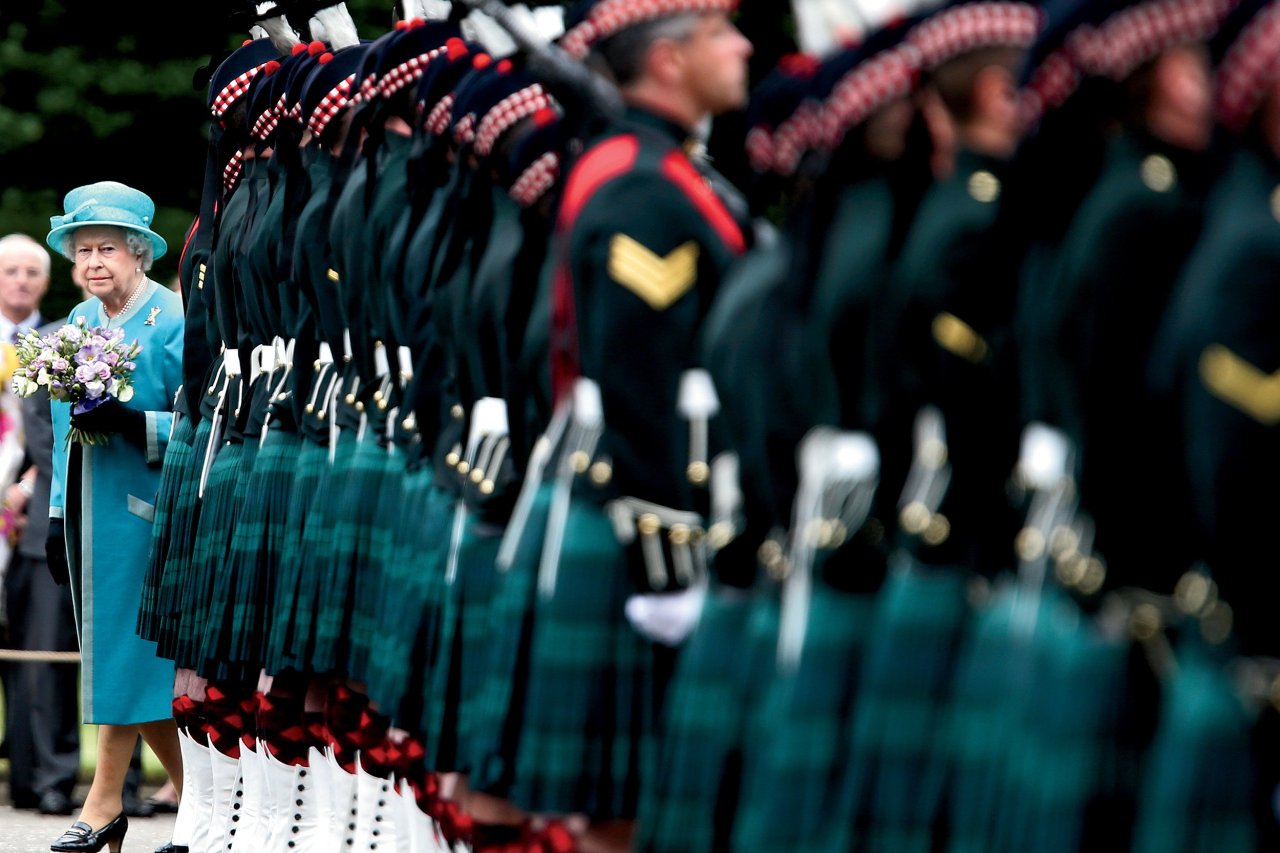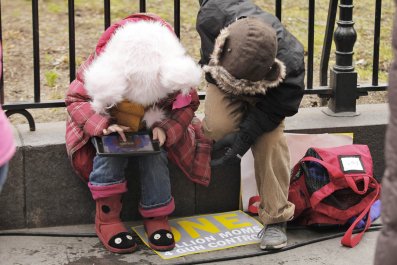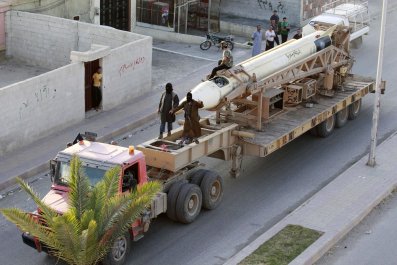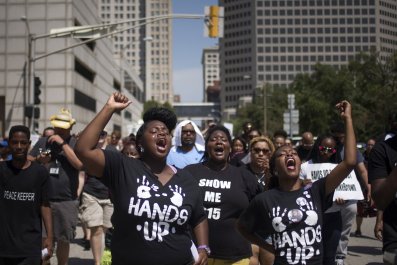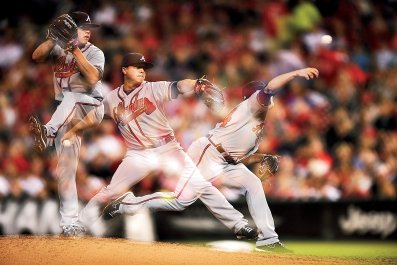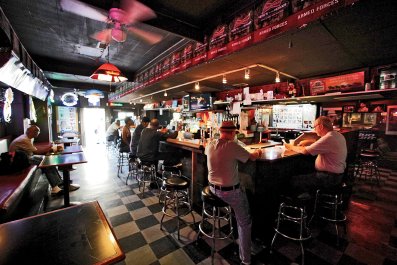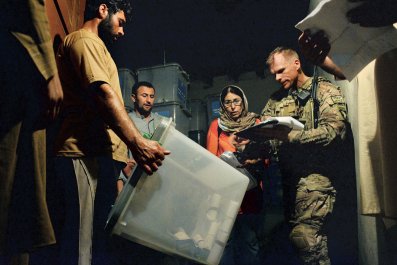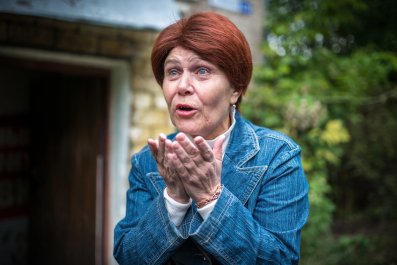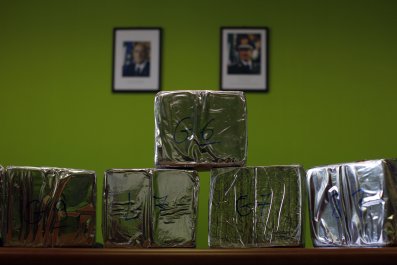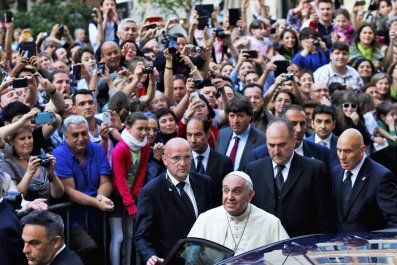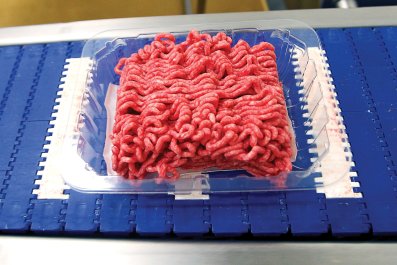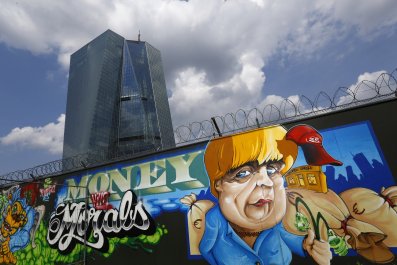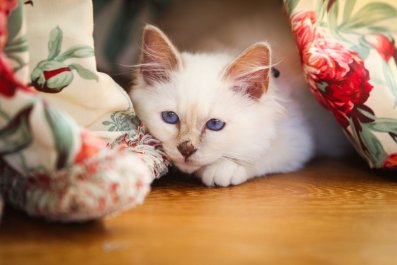In 1977, Queen Elizabeth II addressed the British Parliament on the eve of a vote on Scottish "devolution" that led to the re-creation of a separate Scottish Parliament in 1999.
"I number kings and queens of England and of Scotland and princes of Wales among my ancestors," the queen said, "and so I can readily understand these aspirations. But I cannot forget that I was crowned queen of Great Britain and Northern Ireland."
"The royal family have understandably kept away from voicing their opinions on the issue of Scottish independence," says Peter Hennessy, a professor of contemporary British history at the University of London's Queen Mary college. "But the queen knew what she was doing when she said that, and I thought that was profoundly her."
According to Hennessy and constitutional expert Vernon Bogdanor, a professor of government at King's College, London, that was probably the nearest she has come to expressing in public her personal feelings about the potential breakup of the United Kingdom, and it suggests the prospect does not make her happy. "It's the only text we have," says Hennessy. "Like a sacred text of the Union, her version of saying that she can't conceive of being anything other than a Brit."
The debate ahead of the September 18 referendum on Scottish independence may have focused on currencies and nuclear weapons, but these sit on top of a more visceral debate about symbolism, national identity and the emotional legacies of history.
"If the Scots want to be independent, it's really a matter of identity—of whether they feel they don't belong, as the Irish decided," says Bogdanor. "The Irish were not asking for higher pensions or better economic conditions, they were saying, 'We don't belong.' The American colonists didn't argue that they'd get higher pensions. They no longer felt any connection to Britain."
Images of a blue-faced Mel Gibson as William Wallace in Braveheart on the one hand, or Queen Victoria's "Thin Red Line" of Highland infantry repulsing massed Russian cavalry at the Battle of Balaclava on the other, lurk beneath the arguments about whether Scots might be better off within or, as the Scots say, "outwith" the Union. And few are more implicated in that symbolism than the queen. Awkward issues about her constitutional role could lie ahead, especially if she becomes head of state in two squabbling neighbor kingdoms. But it is at this emotional and cultural level that Scotland's decision may prove momentous.
The psychological effects if Scotland sues for divorce will be felt south of the border and in Northern Ireland as well. "I have one Scottish grandmother and family living in the northern isles, but it matters a great deal to me," says Hennessy. "If you grew up in that postwar baby bulge, you naturally thought of yourself as a Brit because we'd had that great shared collective exercise of the Second World War. There was no anguishing back in the 1950s about national identity. So I find it personally searing to contemplate the Union breaking up. She would never say so in public, but I would guess the queen would too."
Such a sense of a common bond is historically recent. The current queen's two crowns were not combined on one head until 1603, when King James VI of Scotland assumed the throne of England. What mattered to the English grandees was that James was a Protestant, saving England from the worst of the religious warfare that was ravaging the rest of Europe.
Yet despite James's enthusiastic efforts, it took over a hundred years for the two kingdoms to join as one state. Ironically, in view of contemporary events, it was the English Parliament that blocked the union. Scotland was regarded as poor, economically and culturally backward and a troublesome nuisance.
As power in England was gradually wrested from the monarchy and transferred to Parliament, the Scots became resentful that foreign politicians were deciding the choice of their king. When English politicians engineered the coup that replaced the Catholic James II with his Protestant elder daughter Mary and her Dutch husband, William of Orange, in 1689, most Scots acquiesced.
The majority Lowlanders spoke Scots, a language closely related to English; were Protestant; and had been alarmed by James's attempts to re-Catholicize his kingdoms. But the Gaelic-speaking Highlanders were mainly Catholic and launched the first of several "Jacobite" rebellions aimed at restoring James.
When it became clear that the last Stuart monarch, Queen Anne, would die childless, the issue of succession became critical. The Scottish Parliament asserted its right to select Scotland's next monarch. Fearing that a split of the monarchies might open a back door for French or Spanish invaders, the English offered the Scots full trading rights at home and abroad in return for political union. The Scottish Parliament voted to accept.
The United Kingdom was born in 1707, and Anne's Protestant relative, the German George, prince-elector of Hanover (an ancestor of the current queen), took the throne. This hasty and pressured deal has led to the lingering belief among many Scots that they lost their independence through betrayal. "We were bought and sold for English gold," as Robert Burns put it.
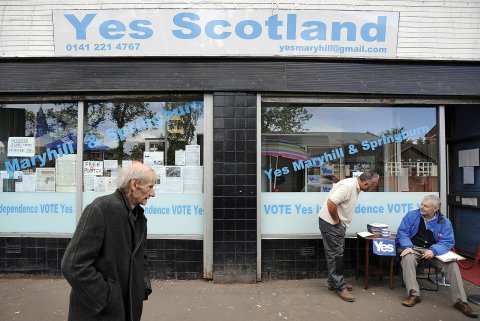
For the next 40 years, the new Union was threatened by Jacobite rebellions, energized by resentful Highlanders. The last was crushed in 1745, and the Union seemed secure. Meanwhile, the Highlands were ruthlessly "cleared" of people by their landlords to be restocked with more profitable sheep.
Yet when this cruel and unjust process was complete, something strange happened. A romanticized version of Highlands culture came to represent the very essence of Scottishness. Kilted Highland regiments swelled the British and colonial armies. Clan tartans were invented. Bagpipes droned as writers like Burns and Sir Walter Scott celebrated ancient traditions, turning the poverty and feuding of Highlands history into romantic folklore.
In a final irony, nobody embraced this more enthusiastically than the Hanoverian Queen Victoria and her German consort, Prince Albert, who helped design Balmoral Castle, that Scottish baronial folly where Queen Elizabeth spends her summer vacations, roaming the heather-clad hills and attending the Highland Games at Braemar.
Yet Elizabeth's personal commitment to Scotland goes beyond mere cultural nostalgia, as Hennessy points out. "Her many visits to schools, hospitals and industrial sites are not Monarch of the Glen stuff at all. She also spends one week every summer in Holyroodhouse Palace, the ancient seat of the Scottish monarchs in Edinburgh, attending to official duties."
So how might Scottish independence change the queen's relationship to the kingdom? "It won't," says Professor Alan Boyle of the University of Edinburgh, a constitutional expert who has advised British Prime Minister David Cameron and the British Parliament on these matters, "unless Scotland becomes a republic, which is not currently proposed."
In March, Scottish Justice Secretary Kenny MacAskill suggested that independence could trigger a referendum on the monarchy, but this has never been the Scottish National Party's (SNP) policy, and its republican wing has gone quiet in the run-up to the referendum.
"In my view, the monarchy remains secure," says David Steel, the former British Liberal Party leader who has acted as the queen's proxy, both as presiding officer to the devolved Scottish Parliament and as Lord High Commissioner to the General Assembly of the Church of Scotland. "Some nationalists are calling for a referendum, but they are a small but vocal minority and would not gather support."
The queen is already monarch of 16 separate realms, from Canada to Tuvalu. According to Boyle and Bogdanor, Scotland would simply become the 17th, and this process should be unproblematic. Hennessy is not so sure. "There are all sorts of models for the relationship of a monarch to a former colony or dependency," he says, "but this is different because the relationship has been so much closer. This is flesh of our flesh."
Queen Elizabeth has no political power and can act only on the advice of elected politicians, which is why most commentators seem to agree that the division of the kingdoms would not shake one of her famous disciplines: remaining tight-lipped about her own political opinions.
Yet she is still the official voice of her kingdoms. Most conflicts would be kept at arm's length, says Bogdanor, because she would probably be represented by a governor general. But she opens the Westminster Parliament with the "Queen's Speech" outlining her government's legislative program. "At the moment, she does not make a Queen's Speech in the Scottish Parliament," says Bogdanor, "but with independence she could be asked to."
So could she end up speaking for two governments at loggerheads? There are many unresolved issues that could prove extremely thorny: whether an independent Scotland would keep the pound sterling and whether the remaining U.K. would have to move its nuclear submarine fleet from its base on the River Clyde.
"It would be really unfortunate if the negotiations for separation after a yes vote became acrimonious, which there's a very high chance they would," says Hennessy. "People would try and politicize the question of her. She'd never do that herself, but others might try to. With the republican strain in the SNP, that could all get very tricky."
One area that seems relatively unproblematic is the one that caused the Stuarts the most trouble. The queen is titular head of the Anglican Church of England, but despite attempts by her Stuart predecessors to control the Presbyterian Church of Scotland, the latter became self-governing, and she is represented at their ruling General Assembly by a Lord High Commissioner. "Some would say it's typical British pragmatism: genius or confusion!" says Bogdanor.The Union started as "an uneasy, unequal and mercenary match," said Professor Clare Jackson of Cambridge University in a recent broadcast, "but a marriage nonetheless." And that, rather than any potential difficulties of protocol, may make the rift distressing for the queen if Scotland votes for independence.
"It will be a terrible psychological blow for the rest of the United Kingdom," says Hennessy. "And even if, as the polls suggest, Scotland votes no to independence, there will need to be a lot of effort put into repairing the Union, which has been severely damaged."
Few are better placed to help such a process than the queen. If Hennessy is right and Scotland votes against ending this turbulent 300-year-old marriage, she may face a challenge as great as a dissolution of the U.K.
This story has been clarified to reflect that the queen is not head of the Presbyterian Church of Scotland.



